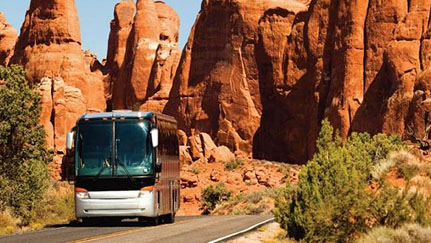
Today’s luxury recreational vehicles come equipped with amenities similar to high-end vacation homes. Before you rent an RV and plan your road trip, there are some important things to know.
When renting an RV, whether from a rental company or on a peer-to-peer network, make an informed decision. RVs come in different shapes and sizes and with amenities that could make or break your trip.1 Here are some things to look for when searching for your rental:
5-star rating — this can indicate that the vehicle is well maintained and safe to drive
Important listing details including the daily rate, mileage fees, minimum rental term, vehicle age, gas mileage, pet-friendliness, the security deposit, any additional fees and the cancellation policy
High-end amenities such as a rearview camera, a high-tech indoor and outdoor entertainment system with Wi-Fi, an exterior television, a washer/dryer and a full-size refrigerator
King- and queen-sized beds with premium mattresses
The RV power source — is it a generator, propane, batteries or electrical plug-in?
Licensed to drive
Licensing requirements vary depending on the states you’re traveling in, so it would be wise to discuss the issue with your insurance professional or lawyer. If you’re hiring a driver for your trip, verify licenses, training, driving record and experience.2
If you’re interested in driving the RV yourself, consider taking a training class to learn to safely maneuver the vehicle. Make sure you’re well-versed in comfortably, confidently driving with this extra weight and size.
Make parking reservations in advance and familiarize yourself with the park’s office hours and check-in policy.
Protect yourself and your belongings
Always keep your doors, windows and bays locked when you are away from the RV. Many RVs share the same locking systems, so one key can open many doors. If you own your RV, be sure to install a deadbolt lock on the doors. Another option is to install a camera and security system.3
To avoid becoming a target, don’t display flashy or expensive items. If you have a safe in your RV, use it. If you don’t have one, take your valuables with you when you leave the RV. Never leave gear outside when you leave the RV.
Lastly, check in with trusted friends or family members to make sure they know your plans for timing and locations. By sharing your schedule, you’ll not only give them peace of mind, but you’ll also be creating a backup plan in case of the unexpected.
Make sure you’re covered
Once you’ve decided to travel in a RV, purchasing insurance coverage is an important safety consideration. Before heading out, make sure you’re protected against potential losses. Most RV rental companies offer insurance. Ask your agent for advice about the necessary protection.
Get help on the road
Many RV rental companies offer add-on roadside assistance. Ask yours for details.
Taking a road trip doesn’t mean leaving luxury behind. With smart planning, you can explore vacationing in a new way while traveling with all the comforts of home.
If you have any questions, please contact your agent or Nationwide Private Client Risk Solutions professional. For more information on how you can help prevent losses, visit nationwide.com/solutionseries.
[2] rvshare.com/rv/do-you-need-a-special-license-to-drive-an-rv
[3] rvuniversity.com/staticpages/index.php/Basic_RV_Safety_101
[4] Coverages vary by state, so check with your policy or insurance agent to verify your benefits.